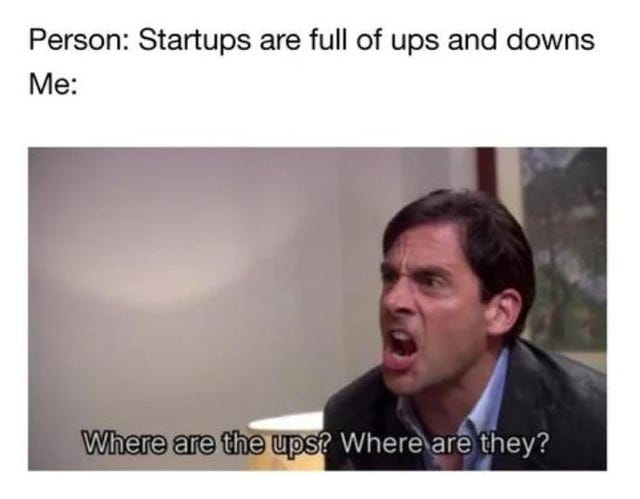How Startup CMOs Can Succeed Without Burning Out
Most startup CMOs are set up to fail. Here’s how to break the cycle and actually succeed.
Uncharted Snippets 🔎
My favourite finds of the week:
Nvidia just lost $600B 🤯
DeepSeek (China's new AI darling) rise shows how fast disruption happens. Market dominance is temporary, even for tech giants. Watch your blind spots.Learn how to use Google Deep Research AI [Video] 🤖
Gemini 1.5 Pro could transform your research workflow. If you're still doing manual market or product research, it's time to upgrade your toolkit.Organic marketing is your startup’s edge. 💪
With CAC skyrocketing, smart companies are doubling down on SEO, content, and community. Don't leave long-term value on the table.
This Week's Reality Check ✅
How to survive as a startup CMO
Most startup CMOs don’t fail because they’re bad.
They fail because they were promised a rocketship and got handed a paper plane.
They’re promised a rocketship but handed a paper plane, impossible goals, no resources, and a product that isn’t ready.
Then reality hits. And guess who takes the blame?
Startup marketing isn't corporate marketing with smaller budgets. It's a completely different game and no one gives CMOs the rulebook before they jump in.
To unpack why this keeps happening, I sat down with Danny Denhard, a startup marketing advisor, coach, and growth expert with:
20+ years experience growing startups
Led EMEA's largest crowdfunding platform
Scaled companies through IPOs & acquisitions
Now coaches founders & CMOs through the chaos
This week I cover:
✅ Why most CMOs flame out in startups
✅ The biggest hiring mistakes founders make
✅ How to avoid bad founder-CMO fit
✅ When to hire fractional vs. full-time
If you're a CMO eyeing a startup job or a founder hiring your first marketing leader—read this first. It could save you from a six-figure mistake like this one.
Q1: Why most startup CMOs fail?
Because having "Ex-Google" on your LinkedIn doesn't teach you how to build something from scratch.
The challenge isn't talent.
It's context switching.
Corporate marketing provides:
✅ Established teams
✅ Proven playbooks
✅ Clear metrics
Startups require:
Building from zero
Creating playbooks
Defining success metrics
Hands-on execution
Danny: "A lot of startups set terrible OKRs. Totally unachievable targets that aren’t based on reality. Then when the CMO doesn’t hit them, they’re blamed for ‘underperforming.’ But the problem isn’t execution. It’s goal-setting.”
If a CMO can’t create momentum from nothing, they’ll fail. They can’t just strategise. They have to execute.
Danny: “Most startup CMOs get fired because they didn’t roll up their sleeves fast enough.”
Q2: Why founders keep hiring the wrong CMOs?
Founders often hire for:
Big tech experience
Strategic vision
Brand building
They hire logos to impress VCs, then wonder why nothing gets built.
But early startups need:
✅ Scrappy execution
✅ Channel validation
✅ Growth experimentation
✅ Quick iteration cycles
Danny: “People think hiring an ex-Google or ex-Meta CMO will level up their startup. It won’t. In big companies, these CMOs had teams of 20+ and million-dollar budgets. In your startup? They have no budget, no team, and no playbook. Most of them haven’t been in the trenches for years (if ever). That’s why they fail.”
At Google, they had:
✅ Teams of 20+ marketers
✅ Endless data to optimise
✅ Established product-market fit
At your startup? They have none of that.
The right CMO for a startup is someone who:
✔ Can work without a playbook
✔ Understands early-stage growth, not just branding
✔ Knows how to do the work, not just delegate
Founders need to stop hiring logos.
Hire people who actually know how to grow a startup.
Q3: Red flags of a failing CMO-Founder partnership?
The founder-CMO relationship is one of the most fragile partnerships in a startup. It’s also one of the least talked about.
When it works:
Marketing drives growth, founders provide resources, companies scale.
When it fails:
CMOs leave within 12 months, taking valuable time and resources with them.
Key alignment points:
Expectations: Define clear success metrics
Resources: Match goals to available budget
Timeline: Agree on realistic milestones
Autonomy: Set clear decision boundaries
Communication: Weekly alignment on priorities
Here’s the reality:
Founders expect magic. Many think hiring a CMO will instantly unlock growth, without considering product-market fit, budget, or execution.
CMOs expect autonomy. They assume they’ll have the freedom to build and execute a real marketing strategy.
Neither side is fully aligned. This results in miscommunication, frustration, and a short-lived tenure.
So how do you avoid stepping into a doomed partnership?
Danny: "The biggest mistake CMOs make is assuming the founder knows what they want from marketing. Most don’t. They’re either looking for a mini version of themselves or someone completely different. But they might have no idea what ‘good’ actually looks like."
Signs you’re walking into a doomed partnership 🚨
✅ Vague expectations – If the founder can’t define what success looks like beyond “grow revenue,” run.
✅ Short-term thinking – If they expect immediate results but won’t invest in foundational work (brand, positioning, content), they don’t understand marketing.
✅ Founder as bottleneck – If they insist on approving every campaign, they won’t let you do your job.
✅ A history of churn – Ask what happened to the last marketing lead. If they left quickly, there’s a deeper issue.
✅ No real budget – If they want “high-growth marketing” but won’t commit to hiring or ad spend, they’re not serious.
✅ Dodging hard questions – If they avoid direct questions about churn, CAC, runway, or product challenges, assume the worst.
Q4: How to avoid getting sold a startup fantasy?
Here’s the dirty secret: Founders always sell the dream.
Danny: "When a founder is selling the dream too hard, ask tough questions. Ask for real revenue numbers. Talk to the CFO, not just the founder. If you get vague answers, assume the worst."
They’ll say:
🚀 "We’re growing fast."
🚀 "We have an amazing product."
🚀 "We just need the right marketing leader."
But the reality?
❌ Growth is stalling.
❌ The product is full of problems.
❌ There’s no budget for real marketing.
“I once went through a hiring process where the founder kept talking about how fast they were scaling. Ten conversations in, I started digging deeper and the numbers didn’t add up. The product wasn’t ready. The marketing expectations were a fantasy. If I hadn’t asked tough questions, I would’ve walked into a disaster.”
How to Test for Fit Before Taking the Job
Before you sign on as a startup CMO, run this due diligence test to avoid walking into a disaster:
Clarify Expectations: Ask what they expect from marketing. If the answer is just "grow revenue" or "figure it out," push for specifics.
Understand Their Marketing View: If they only see marketing as performance ads and lead gen, expect resistance to brand-building and long-term plays.
Meet Them Outside the Office: Founders are in “sales mode” during interviews. Have an informal chat—a coffee, a walk, or dinner—to see if their story holds up.
Talk to the CFO: Founders tend to be optimistic. The CFO will give you the real numbers.
Test How They Handle Pushback: Challenge one of their growth assumptions. If they get defensive now, expect more of the same later.
Danny: “Startups aren’t failing because of bad marketing. They’re failing because they don’t have product-market fit and CMOs can’t fix that.”
Q5: Full-Time vs. Fractional CMO?
It depends.
Hire a fractional CMO if:
✅ You need strategic guidance but aren’t ready for a full-time leader.
✅ Your team needs mentorship more than execution.
✅ You want a high-trust advisor without the long-term commitment.
Hire a full-time CMO if:
✅ You’ve found product-market fit and need to scale.
✅ You’re ready to build a full marketing team.
✅ You need someone 100% focused on your business.
The mistake? Hiring a full-time CMO too early.
If your startup is still figuring things out, you don’t need a CMO. You need a growth-minded operator who can test, iterate, and build demand from zero.
Danny:“A lot of startups think they need a CMO when they’re pre-seed or Series A. What they actually need is someone who can validate channels, build initial demand, and prove what works. A CMO isn’t a miracle worker. If there’s no traction, there’s no marketing playbook that will fix that.”
Q6: The most overlooked factor in startup CMO success?
They underestimate how much product matters.
Most CMOs join a startup thinking:
“I’ll drive demand, and the business will grow.”
If the product isn’t ready, no amount of marketing will fix it.
Signs the product isn’t there yet:
🚨 High churn rates (over industry standard)
🚨 Sales team struggling to convert qualified leads
🚨 Low organic product adoption
🚨 Customer feedback shows major gaps
🚨 Core features still in development
🚨 User engagement metrics declining
plus these…
🚩 Sales team drinking heavily
🚩 Support team updating their LinkedIn
🚩 Engineers started a secret Slack channel called "escape-plan"
🚩 Your NPS score is imaginary
Danny: “A startup CMO without product-market fit is like a sprinter on a treadmill moving fast, but going nowhere.”
Before joining a startup, CMOs should sit with the product team, talk to customers, and see if people actually love the product.
If they don’t, marketing won’t fix it.
Q7: The 3 essential skills every startup CMO needs?
Three things:
1️⃣ IQ (Marketing & Product Mastery) – You need to understand how growth, brand, and product all connect. If you only know one, you’ll struggle.
2️⃣ EQ (Emotional Intelligence & Leadership) – Startups are chaotic. You need to manage up, down, and sideways. If you can’t navigate relationships, you won’t survive.
3️⃣ PQ (Political Intelligence) – The best CMOs know how to play the internal game. If you can’t sell your ideas to the founder and board, you’ll never get the resources you need.
It’s not just about knowing marketing. It’s about knowing how to operate in a high-stakes, fast-changing chaotic environment.
Danny’s recommended reading for CMOs & Founders
📖 Thinking in Bets – Annie Duke (Decision-making under uncertainty)
📖 Tiny Habits – BJ Fogg (Building marketing momentum)
📖 The Cold Start Problem – Andrew Chen (Understanding network effects & growth)
Where to find Danny online
My final takeaways
For CMOs 🚀
Validate before you join → spend time with the product and customers
Build systems first → create scalable foundations
Execute, don't just strategise → get your hands dirty
Focus on metrics that matter → not vanity numbers
For Founders🔥
Hire for your stage → match expertise to your needs
Invest in foundations → give marketing real resources
Trust your operators → let them build and execute
Be honest about challenges → transparency drives success
Success in startup marketing isn't about fairytales or quick fixes.
It's about building solid foundations, executing relentlessly, and staying focused on real customer value.
Until next week —> keep growing, no fairytales required.
Martin





“It's context switching.” - this is a great point that expands out beyond marketing experience.
That are great insight, Martin! Also, one thing I call "does this founder get marketing" is often overlooked... and is one reason why unrealistic OKRs are set. If the founder does not understand marketing and sets the direction here, then failure is often pre-programmed.